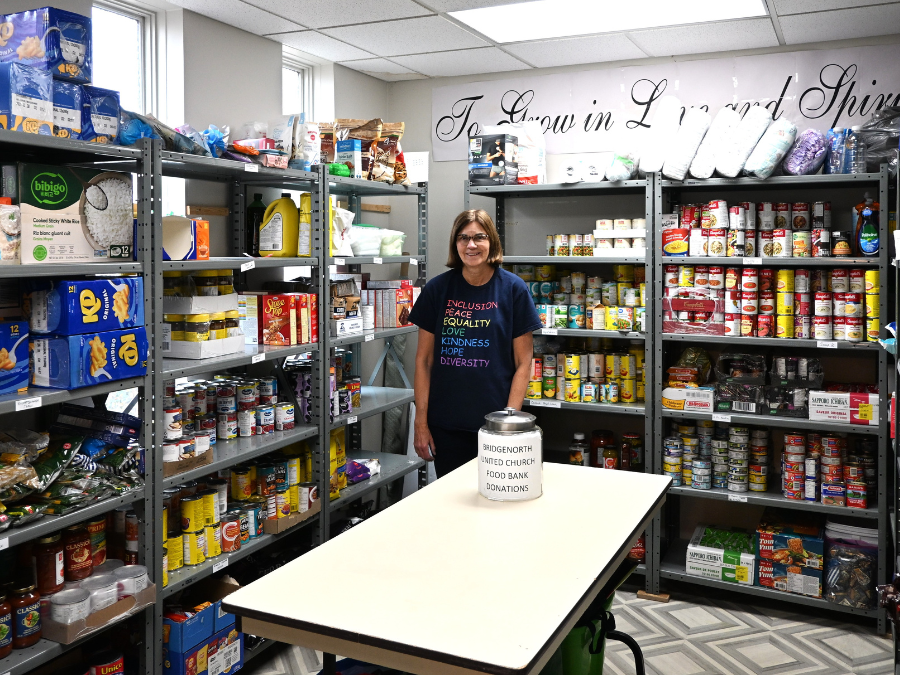Ontario Premier Doug Ford’s move to privatize blue-box recycling in Ontario has set off a crisis within the province’s 1,200 food banks. At a time when the 2025 Feed Ontario hunger report notes that Ontario’s food banks have seen a tripling in demand in just the last five years, the Ford administration is effectively handing over the cost of recycling cardboard to the food banks through amendments to the Resource Recovery and Circular Economy Act, 2016. These changes come into effect on Jan. 1, 2026.
Non-residential properties were omitted from the legislation, and as a result, no longer qualify for street-side recycling. They will have to pay to deliver their recycling to their local landfill or to a recycling depot. This includes churches, non-profits, daycares and charities, as well as all retailers.
You may unsubscribe from any of our newsletters at any time.
In Peterborough County, Ont., Bridgenorth United Church’s food bank, which feeds 250 people a month and is entirely run by donations and volunteers, has already lost its cardboard pickup service. “We serve all Selwyn County and Curve Lake First Nation,” notes food bank volunteer Joe Latour. “We have three large blue boxes of cardboard a week. Now we are expected to take it away ourselves and pay to have it recycled. We’re run entirely by seniors. We’re already maxed out and have no budget. What are we supposed to do?”
Ontario argues that transitioning responsibility for cardboard recycling from government to producers “will save the taxpayer money and incentivize corporations to produce less waste.” The Ministry of Environment webpage further states the new amendments will “ensure the long-term sustainability and affordability of the Blue Box system while maintaining access to recycling services for residents.”
Just over an hour north of Bridgenorth in Bancroft, Ont., mayor Paul Jenkins explains that the town has lost $200,000 from its recycling budget. Municipalities will no longer receive income for recycling materials. “We have to start charging to recycle cardboard,” Jenkins says. “We have no choice.”
“Now we have to come up with thousands of dollars,” says Richard Fogg, volunteer chair of Bancroft’s North Hastings Community Cupboard (NHCC). “We have to pay a $600 upfront fee just for the privilege of recycling. The cost to the food bank could easily be several thousand dollars next year. That’s money not available for purchasing food. I’ve tried numerous times to call other recycling companies to compare prices. No one calls us back.”
The CEO of Toronto’s Daily Bread food bank, Neil Hetherington, estimates the organization will have to come up with between $225,000 and $250,000 next year to pay for its cardboard recycling. Hetherington notes that Daily Bread supplies 200 other food banks in Toronto and deals with 10,000 to 15,000 boxes a day. “Right now, I’m not sure where that money will come from,” he says.
The current solution for smaller rural food banks is to have volunteers divide up the cardboard and put it in their residential recycling. “Some community members are taking cardboard home,” explains Jo Pearson of NHCC, “and we are encouraging anyone with a car to take a box instead of a bag. But we deal mostly with large boxes. They quickly take up a tremendous amount of space. They attract vermin and get in the way of our security cameras.”
More on Broadview:
- Ontario’s living wage just went up — here’s why that’s important
- What’s the secret to a more sustainable future?
- 4 ways to create less waste this holiday
Latour says the Bridgenorth food bank was caught off guard by the changes. “We found out about it at the end of September in the local newspaper. We can’t even get a cost estimate from anyone.”
It would cost Peterborough an estimated $600,000 to $700,000 annually to continue the blue box program to the estimated 550 “ineligible” properties in the county, says Kerri Snoddy, Peterborough County’s manager of waste management and sustainability, in an email.
The Paper and Paperboard Packaging Environmental Council, which calls itself the environmental voice of the Canadian paper packaging industry, reports that the recovery rate for cardboard and paper in Ontario is 98 percent, and that paper can be recycled seven times. “The danger,” says Karen Wirsig, the plastics program manager for the Canadian advocacy group Environmental Defence, “is that people will get out of the habit of participating in a successful program. We’re going to see less waste diversion.”
She says the deeper problem with this legislation “is that there is no obligation to recycle. These amendments simply reveal the enormous gap in services. We are missing an opportunity to rethink how much waste is produced.”
Wirsig points to potential solutions for cardboard. First, let’s explore who is making money off the status quo. Then let’s explore reverse logistics. Let’s return the boxes to the food producers to use again. We should be looking at reusable collapsible totes. But when there is no obligation, we become massive producers of waste.”
At the Peterborough council meeting on Nov. 5, council voted to “strongly urge” the provincial government to reinstate blue box collection for non-profits, including food banks. The county also advises residents to contact the province to push against the change.
Latour has been lobbying too. “We have written letters to the newspapers and our MPP. So far all we have received is an official thank you and ‘It will be passed to the appropriate minister,’” he says. “This is a crisis that is currently flying under the radar.”
***
Sherwood Hines is a writer in Bancroft, Ont.














We are about to see recycling go into the garbage. Sad, because the majority of churches are very conscientious of what goes into each bin. I have a feeling, this new “idea / law” will be changed in the near future.